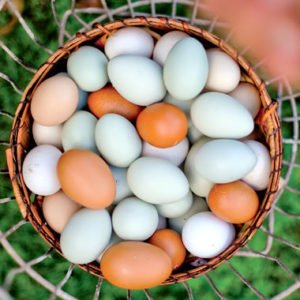
Instant Mood Boost
Eggs contain a beneficial blend of omega-3 fatty acids, zinc, B vitamins, and iodide, nutrients that work together to battle fatigue and reverse bad moods. Don’t be tricked by “free-range” eggs. The hens may still be housed inside of warehouses but at least not in tiny cages.
Nourish Your Muscular System
Eggs are one of nature’s best food sources, packaging muscle-protecting protein in a low-calorie food. The B12 in eggs aids in muscle contraction, a must for avid gardeners! Don’t be fooled by the word natural on your egg carton. “Natural” eggs could come from hens fed antibiotics and genetically engineered feed, two things banned in organic eggs.
Guard Against Cancer
Women who eat higher levels of choline, a nutrient found in eggs, are 24 percent less likely to develop breast cancer, according to a recent study. One large egg boasts about 30 percent of your recommended dietary allowance of choline. Most choline is concentrated in the yolk.
Feed Your Brain
The choline in eggs helps keep your memory sharp while increasing the release of acetylcholine, a neurotransmitter that helps your brain store and recall information better. Eggs from hens raised outside on grass pastures contain more omega-3 fatty acids that help power your brain. Find a farmer who raises birds on pasture and supplements with organic feed. Eggs from chickens raised on grass produce eggs with much vitamin E, which scientists believe could help protect you from developing Alzheimer’s disease.
Save Your Sight
Eggs are a rich source of lutein and zeaxanthin, antioxidants that help stave off macular degeneration and cataracts. (eat the yolks!) For a more potent eye-protecting meal, mix lutein- and zeaxanthin-rich kale or spinach into your omelet.
Slim Down
Here’s a delicious way to lose weight! When obese people choose an egg breakfast over bagels at least five times a week, they lost 65 percent more weight. And Saint Louis University scientists discovered that eating eggs in the morning led to eating fewer calories throughout the rest of the day, too. Organic, Animal Welfare Approved, and Certified Humane eggs ban the practice of routinely feeding antibiotics to hens.
Stop Extinction
You can help preserve old-school chicken breeds based on the eggs you choose to eat. Industrial farming generally uses one or two different hen breeds, which threatens the diversity of the species’ gene pool. Demand for heritage breed eggs is causing a surge in other breeds—some were or are on the verge of extinction!
Search LocalHarvest.org to find farmers in your area that raise heritage breed hens out on pasture.
Eggs contain a beneficial blend of omega-3 fatty acids, zinc, B vitamins, and iodide, nutrients that work together to battle fatigue and reverse bad moods. Don’t be tricked by “free-range” eggs. The hens may still be housed inside of warehouses but at least not in tiny cages.
Nourish Your Muscular System
Eggs are one of nature’s best food sources, packaging muscle-protecting protein in a low-calorie food. The B12 in eggs aids in muscle contraction, a must for avid gardeners! Don’t be fooled by the word natural on your egg carton. “Natural” eggs could come from hens fed antibiotics and genetically engineered feed, two things banned in organic eggs.
Guard Against Cancer
Women who eat higher levels of choline, a nutrient found in eggs, are 24 percent less likely to develop breast cancer, according to a recent study. One large egg boasts about 30 percent of your recommended dietary allowance of choline. Most choline is concentrated in the yolk.
Feed Your Brain
The choline in eggs helps keep your memory sharp while increasing the release of acetylcholine, a neurotransmitter that helps your brain store and recall information better. Eggs from hens raised outside on grass pastures contain more omega-3 fatty acids that help power your brain. Find a farmer who raises birds on pasture and supplements with organic feed. Eggs from chickens raised on grass produce eggs with much vitamin E, which scientists believe could help protect you from developing Alzheimer’s disease.
Save Your Sight
Eggs are a rich source of lutein and zeaxanthin, antioxidants that help stave off macular degeneration and cataracts. (eat the yolks!) For a more potent eye-protecting meal, mix lutein- and zeaxanthin-rich kale or spinach into your omelet.
Slim Down
Here’s a delicious way to lose weight! When obese people choose an egg breakfast over bagels at least five times a week, they lost 65 percent more weight. And Saint Louis University scientists discovered that eating eggs in the morning led to eating fewer calories throughout the rest of the day, too. Organic, Animal Welfare Approved, and Certified Humane eggs ban the practice of routinely feeding antibiotics to hens.
Stop Extinction
You can help preserve old-school chicken breeds based on the eggs you choose to eat. Industrial farming generally uses one or two different hen breeds, which threatens the diversity of the species’ gene pool. Demand for heritage breed eggs is causing a surge in other breeds—some were or are on the verge of extinction!
Search LocalHarvest.org to find farmers in your area that raise heritage breed hens out on pasture.
How to tell if an egg is rotten. How eggs should look in cold water:
If one to two days old, the egg will lay almost flat along the bottom of the pan.
When one week old, it will angle upwards a bit, but still touch bottom of the pan.
About two weeks, egg will start to stand upright, with tip of egg still touching bottom of pan.
If egg is a few weeks old, it will bob off of bottom of pan. Egg isn’t necessarily rotten, but serve it hard-boiled or baked well.
Beyond four to five weeks after egg is laid, it will float to the top of the water. This is what you call a “rotten egg.”
If one to two days old, the egg will lay almost flat along the bottom of the pan.
When one week old, it will angle upwards a bit, but still touch bottom of the pan.
About two weeks, egg will start to stand upright, with tip of egg still touching bottom of pan.
If egg is a few weeks old, it will bob off of bottom of pan. Egg isn’t necessarily rotten, but serve it hard-boiled or baked well.
Beyond four to five weeks after egg is laid, it will float to the top of the water. This is what you call a “rotten egg.”
Eight reasons to eat eggs for breakfast
1. Keep you feeling full longer than cereal or toast. Help sustain your energy levels and reduce the need for mid morning snack.
2. Assist weight loss.
3. A most complete sources of protein. Contain all essential amino acids we need.
4. Inexpensive.
5. Don’t increase risk for heart disease.
6. Help brain development and memory.
Choline stimulates brain development and function and is linked with increasing memory retention, recall,, and improving alertness.
7. Help protect eyes from damage related to UV exposure. Reduce the likelihood of developing cataracts in old age.
8. Your hair and nails grow faster and stronger.
